Greta Lee & the Art of Being Good At It Over and Over and Over Again
"I don't want to understand everything perfectly."
Greta Lee gives the type of understated tour-de-force performance in Celine Song’s Past Lives that makes you immediately want to log onto Twitter and type some variant of “Greta Lee Oscar when?” It’s no wonder she’s the centerpiece of a movie Rolling Stone is (correctly) hailing “already the best movie of the year.”
And though it’s a significant tonal departure for Lee, she has always been a star. From High Maintenance to Girls to Inside Amy Schumer to New Girl to Broad City, Lee began her career as the go-to for a juicy guest spot or recurring role. She would pop up, you’d fall in love with her, and then she’d be gone, onto the next job. It’s seldom a bad thing to keep them wanting more, but it gave Lee a transient quality rather than the stickiness that can be associated with a breakout role. Then came Russian Doll. Then The Morning Show. And now, in a career-defining performance, Past Lives.
I wanted this interview so bad. It was a feeling that consumed me after seeing the trailer for the film back in February. It happened :48 into the trailer: “He was just this kid in my head for such a long time,” Nora (Lee) says to her husband Arthur (John Magaro) of Hae Sung (Teo Yoo), her childhood sweetheart who has come to America decades later to see her. “I think I just missed him,” she tells him. “Did he miss you?” Arthur asks. Then: A musical cue as though all the air is being sucked out of the room as the trailer cuts to their reunion. The back of his head. “Hae Sung!” she shouts in a tone that isn’t at all a shout. He turns, expressionless. She approaches as though the wind is carrying her and looks into his eyes, deeply. A half-smile. “Woah,” she says. “It’s you.” Then a cover of Rihanna’s “Stay” by Cat Power kicks in and I knew, I just knew.
Months later at a Loewe dinner in Los Angeles, Ali Wong, Young Mazino and I were chatting about the film. I could see Lee through the corner of my eye sitting at the center of the table next to Loewe creative director Jonathan Anderson. “Do you want to meet her?” Wong asked me. “No, no!” I told her, sure that I’d lose the ability to speak if we met. She pulled me over to her anyway. She tapped her on the back and Lee turned around and looked me in the eyes with the same depth I witnessed in that trailer. “Evan Ross Katz,” she said, a sly grin spreading across her face. She knew. Because she’s Greta. She just knows.
I am so excited to have you here for a myriad of reasons, but above all because I really want to talk about Past Lives. I'm loving all the love that the film has been getting online: Pedro Pascal, Kirsten Dunst — so many great celebrities are shouting it out. I'm wondering what it feels like from your perspective to see fellow actors honoring your work, because I don't see a lot of actors touting other actors’ projects very often.
‘Cause actors are petty little bitches. [Chuckles] It's so overwhelming. Honestly, I can’t even pretend to make sense of it. If I didn't find a way to just enjoy this on some level, I would be a supreme asshole. There are certain moments when you just have to grab it and say “thank you so much” and find the joy in it, and that is what I'm actively trying to do. But I'm human and I've lived my life as I know it, and I'd be lying if I didn't say this feels entirely like science fiction.
Sometimes I think processing our experiences in real time is not always the most fruitful pursuit.
I totally agree. I feel like now there's something culturally, because we are in the era of me, me, me. There's this unnatural thing happening where there's an expectation to create your narrative, to instantly understand what is happening to you in the moment and connect all of the dots in this convenient way; in this accessible, palatable way, and then be able to serve it up for everyone. And I'm so allergic to that. Like what happened to the messiness of “I have no fucking idea what's happening right now?” And that's part of it, you know? I don't want to understand everything perfectly.
And the irony of it all is that is ultimately the most relatable attribute. So many people try to feign and construct relatability in this “me, me, me” era, as you say, and if we were to just be honest about the fact that we're all just figuring it out, maybe we would actually get somewhere.
I think so. I think this would be a less embarrassing time for humans if we could just do that better.
Let’s get to a hard-hitting and extremely topical question: I've always been bothered by the fact that your character, Soojin, on HBO's Girls wasn't given a proper send-off. She returns in Season 3 as a gallerist and it's made to seem like she's going to be around for a while. Then she says she has to go to therapy and we never see her again. It bothers me. Where did Soojin go?
Should we call Lena?
Get her on the phone!
I've heard this description of Soojin that she's like one of the premier and earliest examples of nepo babies, and props to Lena for tapping into that at that time, in that space and in that way. In my mind, [Soojin] was kind of the bad guy — which I love. I think that's what felt kind of badass and fresh about being able to play her in the way that I wanted to. She's annoying as sh*t, but I love that about her! And I know [that type of] person — especially at that time in my life, when I had just moved to New York with this Sex and the City fantasy that just failed me immediately and I became instantly poor because I threw all my money away trying to buy one Cosmo. But then there are other people in my life who walk through life with confetti falling into their laps. That kind of ease, matched with the supreme unawareness of that ease — nothing is funnier to me. I love it, and it’s a genuine love. I have a compassion for that kind of person. And I think there's a reason why so many people say, “I love Soojin,” and it always makes me laugh. Like, “I know! I do too!” It’s weird. It's wild!
She also introduced me to rosewater ice cream. I was not aware of that flavor until Soojin.
Yes! She had a scoop. I think that's based on a real thing that actually happened to one of the writer-producers of the show at the time; they actually had an assistant who brought about the inciting incident, [which] was that scoop of ice cream. But I also love that it spoke to an entire class of young Asian American women who were fulfilling this role of effective, high-powered assistant with an outsized confidence and sense of entitlement. It felt like a subgenre to me to represent this group of people. Like, I just know this woman.
Where do you think Soojin is today? I recognize that you are not the writer, but I'm just saying: If we were to prognosticate, where would you want to see Soojin in 2023?
She's dead!
She's dead?!
[Laughs] I'm not even sure what I want for her. If I'm honest, I don't know if I want to see a woman like her evolve. My fantasy is that she is now — I guess she’d be in her forties, but I would love for her to be exactly the same. But I don't know if that's possible. So maybe she's just kicking it with a bunch of twenty-year-olds somewhere in denial. She's like the Vera Wang of her surroundings. She’s like, “I'm doing this. Y2K? Yeah, I’m in! I’m gonna show my thong. I can hang with the rest of you!” Maybe she's doing that.
I do appreciate that her final form — as it existed on the show — is that she's off to therapy in the middle of the workday, because that's just what she does! Now, you are one of those actors that always seems to be working. Even today, you are here to talk about Past Lives, but I went to a screening of Problemista on Friday, and who shows up on my screen but Greta Lee! Then I come to find out you have two movies out right now: You’re also in Spider-Man: Across the Spider-Verse, because God forbid, you only did one movie at a time! That wouldn’t be enough. How do you find the time?
I don't know! I don't know, Evan. [Chuckles] It’s a huge problem. It's the premier problem of my life. When certain things are great and you just have to do them, I jump at it. With Problemista, I had already finished Past Lives. I came home, and I think I was reverberating in in my post-Past Lives fucked-upness and then got a call that was like, “Well, there's a small part in Julio [Torres’s] movie with Tilda Swinton,” and I’ve loved Julio for so long. They were like, “Do you think you could kind of get your shit together to run back over here and do that?” And my husband was like, “Are you for real right now? Like, seriously?” And I went, “Tilda Swinton? Yes, I'll be right back!” So there are certain things that you kind of just have to make yourself available for, and for me, that's Tilda Swinton. But I like working, I guess. That’s an essential piece to this: I just like it.
You're good at it, so it kind of works!
I try to be, and it nevers ends! [Laughs] On a lot of levels, I'm just trying to be good at it over and over and over again.
I would say to great success! Now, let’s pivot to the main event. I try not to think about art as good or bad these days; my metric of sort of “judging” something, if you will — if that's even the word — is sort of: Does it stay with me? Do I think about it? Do I want to talk about it, and for how long? And this is a film I cannot stop thinking about. I re-watched it yesterday in preparation for today, and I began bawling at the end — even before the end, because I knew what was coming. I'm bawling and my fiancé asked me, “Why are you crying?” and I couldn't put it into words. At the end, when your character Nora begins to cry, her release became my release in that moment. And we can be as cognizant about spoilers as you see fit, but I'm just wondering about that final sequence: Could you talk about what is captured in the final minutes of this film?
I'm just gonna talk about it without being nervous about spoilers. We're gonna talk about it! And I also love that on some level, the thing that we're spoiling is just the fact that she cried.
That's the thing! Like, is it a spoiler?
In this case, I would say it is. I have to admit that when I watch it, on occasion, I cry. It's so weird to cry at yourself. I remember the first time I saw it with an audience at Sundance, I really started to cry and I felt really embarrassed because then we had to get up on stage and I was like, “You can’t cry at your own movie! Stop it!!” and I was in a panic about it. But the movie f*cks you up in that way, in that gorgeous way. We were all making this bet on this specific kind of an emotional arc that was really scary. I give [writer/director] Celine Song full credit. You want to be able to show what you can do — to be able to flex and be able to do the thing — but this movie was allergic to that. The second you did that, it dies. So what I had to do was endure months of just trusting that it's enough to just arrive as myself, as Nora, and basically not cry. And I knew at the end, it's in the script that she cries. And that was a whole other loaded question of, “What is that? What does that look like? What’s true in that?” and that was so scary. I’m not trying to shy away from how fucking hard it was just to be honest and to calibrate: What is honest? How can I convey and let the full depth of that sadness and loss come out of me without venturing into histrionics or something that feels melodramatic or false? There's no way to rehearse that. That moment was like skydiving.
And that ending was shot in one take, was it not?
Yes! From the moment she leaves the brownstone and then she has her two minutes of silence before the Uber comes, she says goodbye, and then walks back home to Arthur and has this emotional release. I don't really know how to explain what happened. I feel like I was just in a blackout state. I remember on that day feeling like, “This is impossible! How am I gonna convey that I understand the game plan?” So I did this thing [during rehearsal]: I just clapped. I did these claps. I was walking and I said, “Now I'm here and I come back and I'm starting to cry.” [Laughs] And I just said it like that, like it was music, and then we did it. I remember the first time we did it for real when we were rolling, John Magaro — who plays Arthur — was stunned, but in a way that made me scared that I had fucked up and that it was too much. He was genuinely shocked. I don't think he knew. And then maybe that's right for his character, because he's not around for the stuff that I was shooting with Teo [Yoo]. John was like, “Wow. Oh, my God!” and it made me feel self-conscious, like, “Oh, it was too much.” But that was one of the first moments I think that he understood this is cosmic. This is a no-chill moment. This has consequences. This is a substance. This is animalistic. Anyways. So yes, that's what I have to say about that last scene. [Laughs]
There are so many fabulous details about Nora drizzled throughout this film. One that I particularly love is when Nora is getting on the ferry, Hae Sung asks her if she's hungry, she says yes, he pulls something out of his backpack, and she takes it and immediately bites in. I just feel like so often when people ask you if you're hungry, people just tend to say no. Everyone's always so polite, like, “No, thank you. Thanks for offering!” But Nora says yes and then she takes a bite and she doesn’t even have to know what it is. It's just moments like that where you learn so much about Nora. Is there a specific detail about Nora that you really latched onto?
I love that you picked up on that bagel moment. I love that Nora, on a lot of levels, is so normal. I feel like there are so many portraits of modern women that are either scrubbed clean or you can tell it's in service of the idea of what a woman at the center of a love story should be [in order] to be more palatable or more acceptable. I love all those moments where [Nora] doesn’t give a shit. She's like, “Yeah. Bagel. Hungry. Let's go,” which is so much more recognizable to me. Now, I have to admit that was the first scene, and I was still on my The Morning Show/Russian Doll metronome. I remember finding myself improvising. It’s so amazing that you picked up on that, because while I have an understanding of this and why she needed to just eat [the bagel], as an actor, I can fully admit that I failed and fucked that up because initially I could not stop improvising. It was my own nerves of like, “Oh, my God, we're shooting on film. There's so much silence. It’s taking so long. Why is the camera still on me? Nothing's happening!” I improvised all this bullshit about Russ and Daughters, what kind of bagel this is, schmear? Just trash. And I remember Celine saying to me, really simply, “Stop. Don't do that.” That was a demon that needed to be expelled. This is me crossing the threshold into this new territory where I'm not myself but I'm really showing parts of my being that I'm just not used to showing. I'm much more used to performing and making jokes. I honor those parts of myself: I will forever want to be a song and dance monkey. I find a lot of fulfillment in that. But this was so exposing. I was so uncomfortable.
As you said earlier, it took you a while to acclimate back into the post-Past Lives world — a “post-Past Lives fucked-upness,” in your words. Was that a part of that vulnerability that you’re speaking to?
Yes. I had a lot of conversations with Teo, who plays Hae Sung in the movie — he's just so ugly. So hard to look at.
Hurt my eyes!
It was distracting, honestly, how ugly he was. [Laughs] See, I'm a good actor! He's so German, and he's not here, so I can talk shit about about him. [Laughs] This is genuine: He owns his melancholy in such a different way. It’s cultural. As someone who's highly therapized and American and I’ve had this experience, we collectively have walls. It feels counterintuitive sometimes to be completely vulnerable. It doesn't feel safe because of certain infrastructures in our society and things that have happened; our painful, real history of the experience for any outsider. We are self-engineered to never show that; it's a matter of survival. So then to have to just show that over months, but through her strength?That was really eye-opening and really devastating. And also, just having to do a love story: I've never done that before. I was talking to another actor about how your body doesn't know it's not real. There are all kinds of crazy things, biologically and neurologically, that go into fight or flight, and I feel I can openly say that having to take on not just one, but two deeply connected, deep loves that span multiple decades and lifetimes — like, oh, my God. It really put me in a state where I could finally understand — it sounds so cheesy — but reconciling with this idea that as human people, we have such an innate capacity for love, both giving it and receiving it. It’s boundless. It's endless. I really believe that. At the risk of sounding like Jared Leto at a hippie-dippie retreat, I really feel like I have emerged from the world and I'm kind of looking around like, “Oh, my God. I see this in a different way now.” And I'm so glad for it, too.
I think that you feel that as the viewer. I remember I went to the screening in New York and I walked out afterwards and there was a cocktail reception with everyone chumming about and I was not ready to be around people and talk. I was in process mode; feelings were lifting out of me. So I get it. Now, keeping on the theme of food with the bagel: In this film, your character Nora says that she is craving chicken wings in bed with her husband, and I'm wondering what is Greta's most persistent food craving?
A hotdog. [Smiles] I know. Nitrates are like the number one thing that will kill you. I just have this thing: I think it's all fast food, but it's a nostalgic thing. It's an immigrant kid thing. Look, I am a Hollywood starlet who can green juice like anyone else, but the truth is, I have these days where I need to reset by eating something like a Big Mac with a side of chicken nuggets and sweet and sour sauce. Or a hot dog. Movie theaters make really great hotdogs, and I know [me and] other hot dog enthusiasts can identify each other out in the world. There's just something about it. It's the perfect meal.
Where do you get the perfect hot dog? I feel like it's really easy to tell someone, “This is where the great pizza is” or “this is a great burger.” I'm less familiar with hotdogs. Do you have a spot where you’re like, “This is where the good hotdogs are?”
I don't have them anymore because I moved to LA!
I feel like LA is distinctly not about a hotdog.
Distinctly not about a hotdog. Do you know The Bearded Lady in Brooklyn? Fingers crossed they still do this, but they have such a good hotdog. They understand what an evolved adult who’s functional wanting a hot dog [needs]. They're not shying away from the essence of what makes a really good hot dog to scratch that itch, but they're also able to elevate it while giving you what you need. They do a Chicago-style dog with the whole thing: mustard, tomatoes, onions. One could say maybe it's sort of like there's a salad on the hotdog? So there you go!
It’s its own form of a green juice! I loved the East Village-ness of this film, especially having spent a lot of my formative years in that area. There’s this fantastic interview that director Celine Song did with Vulture where she talks about choosing the block that would be Nora's apartment. Her instructions were, “It has to feel like nobody has ever given a shit about it. But also, it has to feel dreamy. Like the whole film.” I love that description because she and the location scouts succeeded in that. What is one of your favorite blocks in New York City?
It's so hard because anyone who's lived in New York knows that that is the essence of life there: these blocks that are both dumpster fire trash but then also, heaven. So many different parts of New York have their own sense of history. For me, up by Lincoln Center still has this feeling. It brings me right back to being a kid and having this irrational desire to chase this hypothetical dream, for some reason, to be a part of this thing. And it's nameless and wordless, but I knew that there was a version of it that existed by Lincoln Center with the fountain. And I still want to go there. It makes me want to be alive. It makes me feel invigorated. I think I want to be buried there.
It might be a hard permit to get, but you can make things happen!
[Laughs] I’m not there yet. I think some other things need to happen before I have the resources and ability to [do so].
Moving away from Past Lives: RuPaul says that life begins after 40. In Vogue earlier this year, you stated, “I want to not seem so young to people. I find it tiring.” I must say, Greta, I feel that quote. And I bet a lot of people do, too. What are your thoughts around 40 and the decade of 40 as life beginning, as RuPaul claims?
I love that at this point in my life, it's almost impossible to lie about what's going on here. I can't lie! [Laughs] I have too much evidence. There's a whole track record, a full life of people who know me and it would be impossible for me to not show up as myself. And the thing is, people just assume I’m younger. For me, it does have a lot to do with race and being a person of color. I know you can make a lot of jokes about Asians and how we “don't age”, but one experience that I’ve been having over and over again with work is this feeling where I'm constantly having to reintroduce myself in a way. And with that, there are so many assumptions that are made of how old [I am]. People assume that I am much younger, like in my late twenties. And that would feel like a compliment to most people but for me, it just feels so odd to have to kind of gently announce and make clear to people, “Oh, no. I'm 40 years old!” And the painful truth of why that is: It's not pretty. I don't think it's a good reflection of our world. Why would someone presume that I’m half my age? I think there's something to that, and fighting through that feeling: I'm a woman! And I have been. The expectation of what that is, and just kind of refusing to play that game anymore. It feels nice, being 40.
When you have moments like that where the person is saying something that they intend as a compliment to you, but as you're pointing out, you have every reason to be offended by that — and yet their intention is the polar opposite. It feels so complex to me in terms of how to rationalize that.
It's a complicated thing, I think that also as someone who is an outsider — I was trying to explain this to someone: Imagine getting invited to a fancy dinner party; that moment before you ring the doorbell and you step through, you're getting ready to kind of introduce yourself to this group and make yourself known to them. There's a level of making sure I put my best foot forward. Making myself palatable. Taking up space… but not too much space. And then, if you're lucky, experiencing the sensation of success. Like, “I've won them over. I think I'll get invited again.” But then having to repeat that experience over and over and over again, like it's Groundhog's Day. That's what it feels like to be an actor who's a person of color. Or maybe that extends to other people and their experience; anyone who overtly [receives] the messaging that they don't belong. Maybe you will feel like you belong briefly, but that unconscious knowledge that at any given point, you're going to be asked to leave — the dinner’s over until the next time. And I think I'm only now understanding, after years of that, what that is and how that affects me as a person and how it affects my work. I'm burdened by this experience of having to constantly tell them, “Oh, guess what? I'm not 30. I'm 40. Hi, I'm Greta Lee.” How much it's draining energetically, and I wish I could reserve that energy for the actual stuff I want to put all my energy into. I look over at some of my peers and I can admit that sometimes I feel enraged, because I can see that this is something that is singularly my experience in that moment. And I look over and my comrades are eating chips and preparing for the next scene, and I feel like I have this other thing that's going on.
Did you feel like working on this film, and having the opportunity to work with so many Koreans and Korean Americans, and working with Celine, changed the paradigm at all?
It became a non-issue. It was like a Trojan horse in reverse. It was just diverse, and that did something for the process. But also having Celine only direct Teo [Yoo] and I in Korean and normalizing different languages —- it just made space. It was so liberating. I didn't have to feed that machine, taking care of political issues and explaining, “Okay, this is representation, I’m taking up space.” We were just making a movie about love.
How incredible to have Celine giving you direction in Korean like that. What a singular experience to have in a film like this. And then you also have the scenes where she’s speaking English with an English-speaking co-star. It's incredible that you got to experience both of those things on a single film.
You’re right: It is singular. That doesn't happen.
I hate calling that singular.
I hate it too, but it's true, and hopefully it won't be true forever. And I feel like a movie like this is evidence that maybe we're ready for that not to be a singular experience. And it can still be an American movie; maybe even more so.
You are regarded by so many, including myself, as a style icon. I have to say, your recent Loewe Interview magazine shoot that you did: Just the way you wear clothes, it’s just — you've got it. So, how would you describe your style?
I'm so bad at answering these questions, and I kind of want to keep it that way. It's essential to my relationship to clothes. But clothes are a visceral experience for me. That's why I love Jonathan [Anderson] (creative director of Loewe) so much. There's something about his clothing that feels emotive and it feels very like it's honing in on existentialism. There’s this quality to the clothes and how they feel that is hard to pin down, and that's usually what I'm drawn to. And I love Martha Graham. I love women who are in their bodies, and that often informs how I want to dress in my day to day. It's not athleisure: It's the way it feels. It can be track pants or trousers with something that feels athletic and like I have full range of movement and that feels like it has inherent movement to it. I love coats and dusters and things like that. And I love color — it feels silly to have to announce that, but a lot of people don't love color. But I do love color. I'm very activated by that.
I feel like there’s something about being a fashion girl where there’s the conditioning that because you're a fashion girl, color is out the window. So I like that you're a fashion girl who likes color.
Yes, I’m pro-color.
I’m curious about your media diet. Like I said, you're incredibly busy and working constantly. You’re a wife, you’re a mother, you’re a friend. You wear many hats. I imagine you make some time to consume media, so what is it that you're watching?
Well, I have a gaping hole the size of Succession, I think like most people. I don't know what to do about that. I think after Covid, something happened to me where I just wanted to step back a little bit in terms of what I'm consuming and just be a little bit more mindful. I realized how much I was consuming and feeling like as a person, is this unnatural to be consuming this much? I guess I'm talking mostly about TV, and maybe I shouldn't be saying this because it's my industry, but I understand that I’m part of the problem. I just started to feel numb to it; to content. So I think now it has been more of other things. I’ve gone back to museums — I know, I'm an 100-year-old lady, but I do a lot more live music and seeing and experiencing things that don't involve screens. I'm trying to do that, and I can see how much more I'm getting out of it. And this is mostly because Succession ended. [Chuckles]
Listen, I get it. Now, on the museum train — I don't know Los Angeles so I'm gonna keep it New York: What is the museum that you recommend people check out outside of the obvious list? I'll go first, because I was just there recently: the Noguchi Museum in Queens is just mandatory.
Ugh, you took mine! That is it. We can both have it. And also, sidebar: If you're an Akari lamp-head then they have every lamp available for you there. Okay, fine. Aside from that: Now I'm getting to know some of the meaning of the art space more in LA, but I didn't really realize what exactly was at my fingertips [in NYC]. This is not so much a museum, but I've never profoundly missed Joe's Pub so much of my life. [Laughs] I miss going to see random things so much.
You exited social media several years ago. I get the sense from what you said about your media consumption that there might be something wrapped up in that; this idea of just less screen time in general. Is there ever a world in which you could find yourself dipping a toe back in there? I know that for people that remember you from your time on social media, you were something of a legend of the medium, so I'm just wondering if there's any inclination or a small desire to come back?
When I joined, it was this dorky thing. It was a cringy, very real thing. I wasn't famous enough for anyone to know who I was. It ended up being something that I just didn't really want for myself anymore. I could imagine myself coming back to it. I actually thought about it for a minute with Past Lives because I didn't want to look back on that time and, if people didn't show up for the movie, feel like there's something I could have done to help. But I think in the end, I'm still holding on to this. It's how I feel about being 40 and the life that I’m kind of challenging [myself with]. I'm putting myself on assignment with this personal mandate I have for myself as this question: Can I live my life in this way that feels more difficult on some levels? Because I'm not cashing in on certain things that feel accessible or would make certain roads faster. But I'm betting on this other thing, and it's hard to explain. I'm so greedy for life and I don't want to waste it. And everyone's different, but for me, Instagram, social media — that was me wasting it. And sure, I will check it sometimes. I have a fake account — a finsta — that’s just for home decor, like weird vintage French chairs. But I wanted to be present in life, and I didn't think that I could do that while also being on Instagram. It changes your behavior. It changes everything. This might end up being my fatal flaw in terms of my career, but I kind of don't care. It's worth it to me.
It will not be a fatal flaw, if I may say. I am betting on you, Greta Lee.





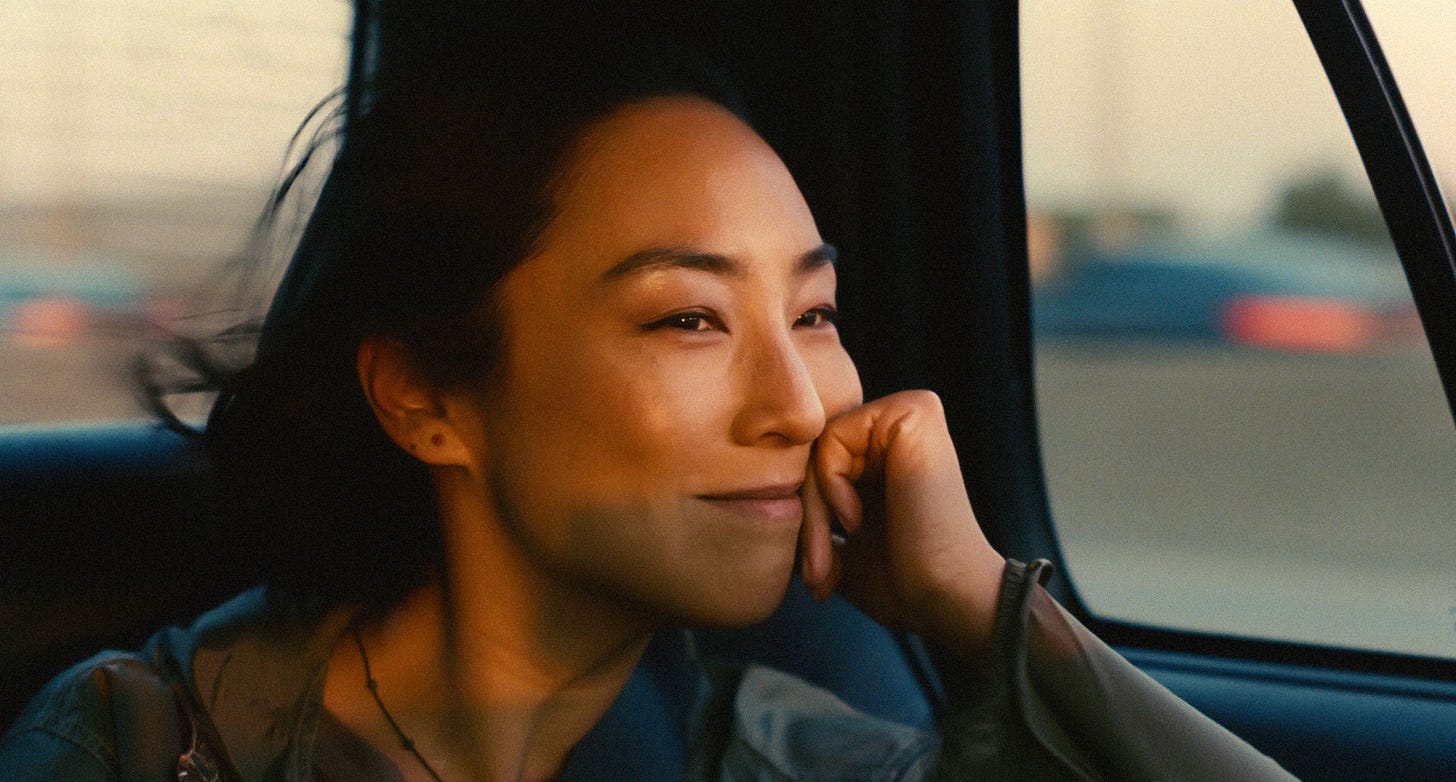
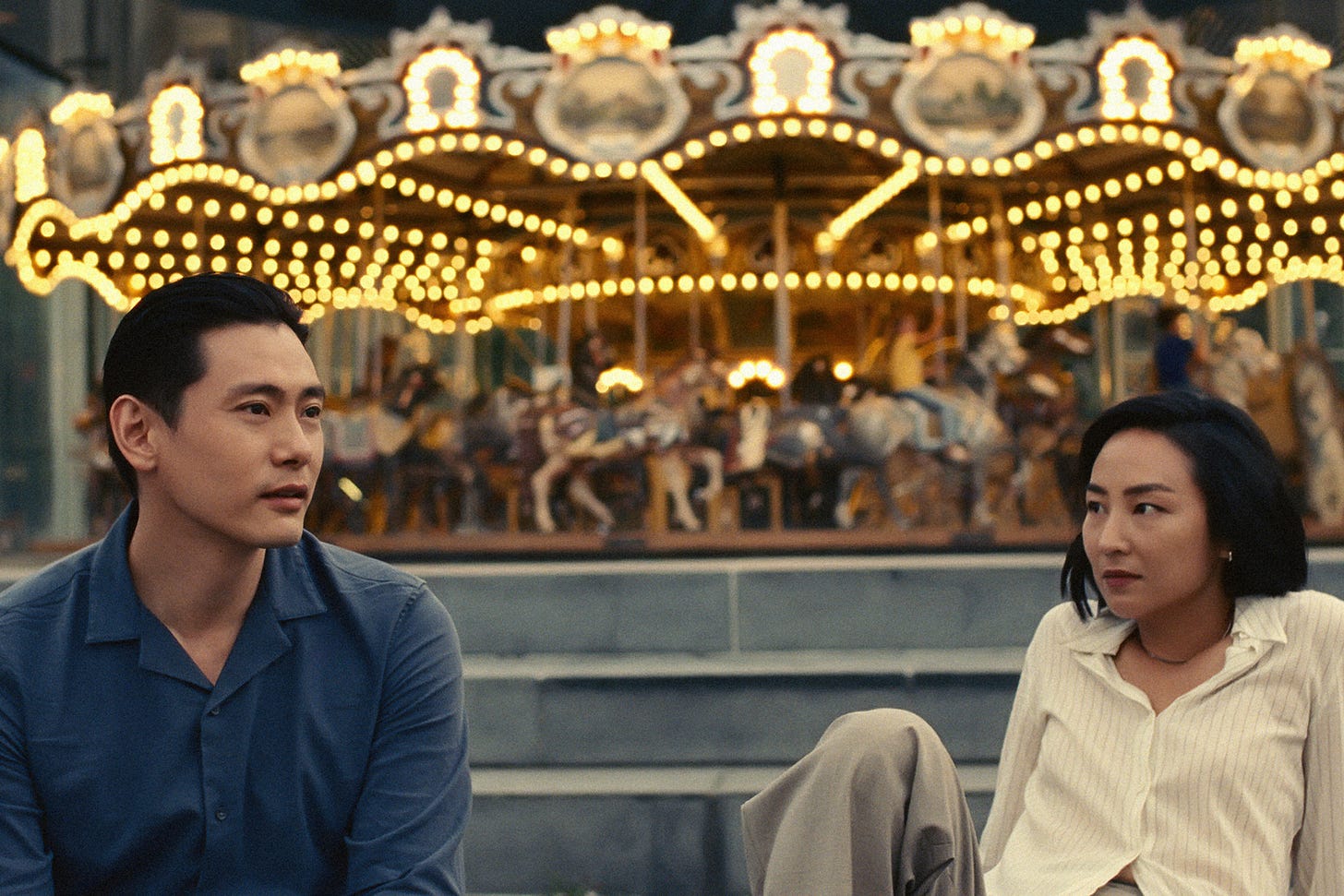
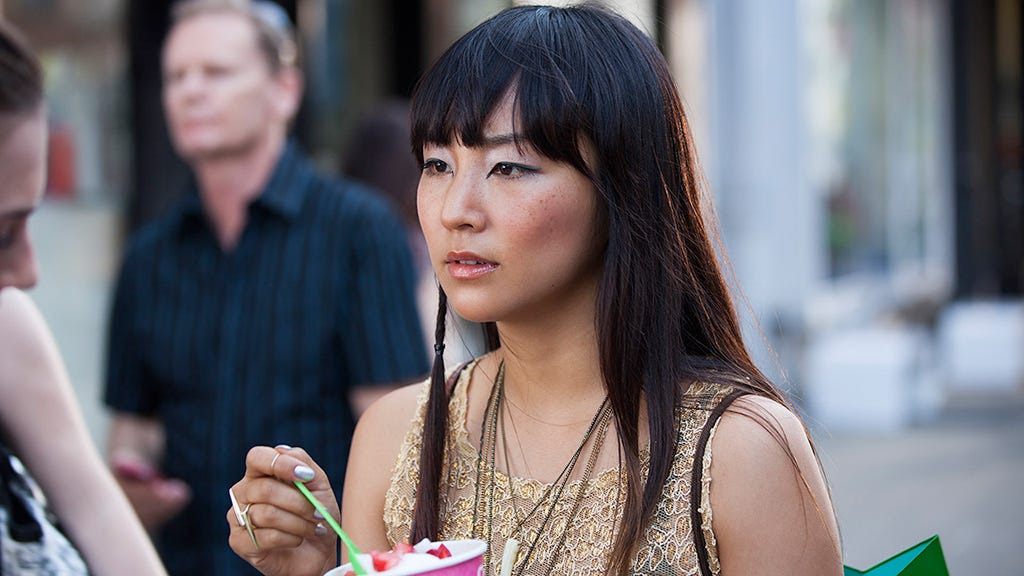
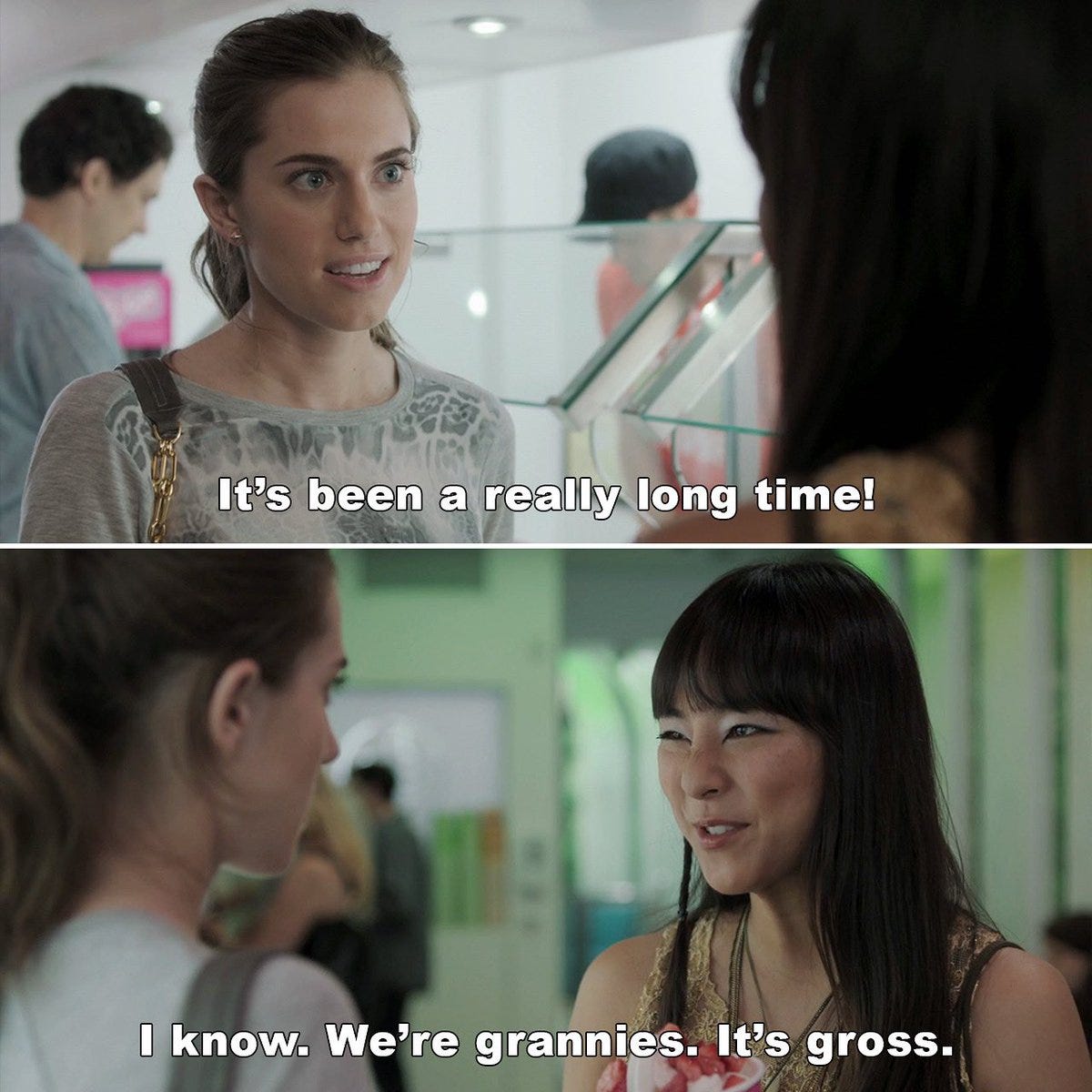
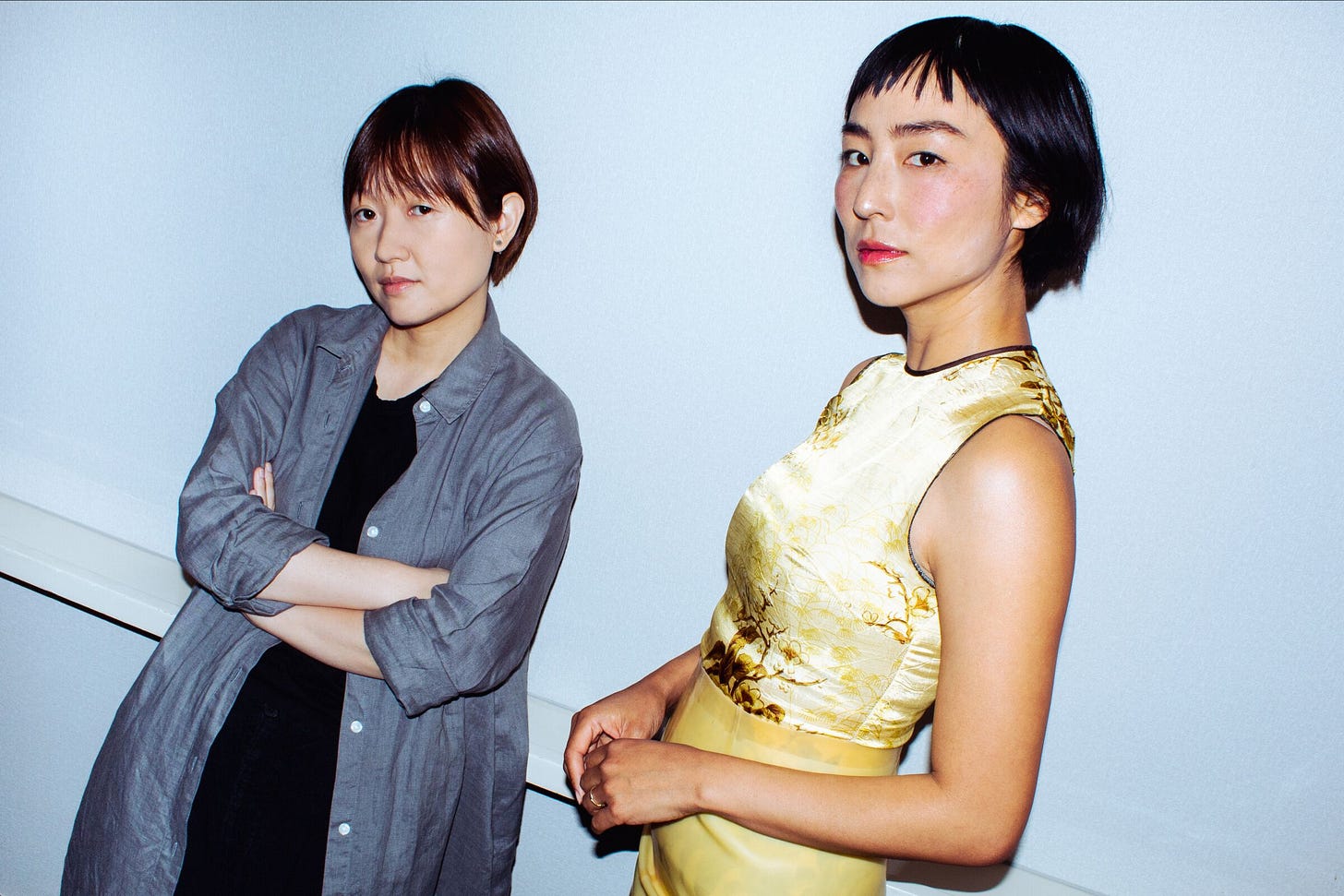
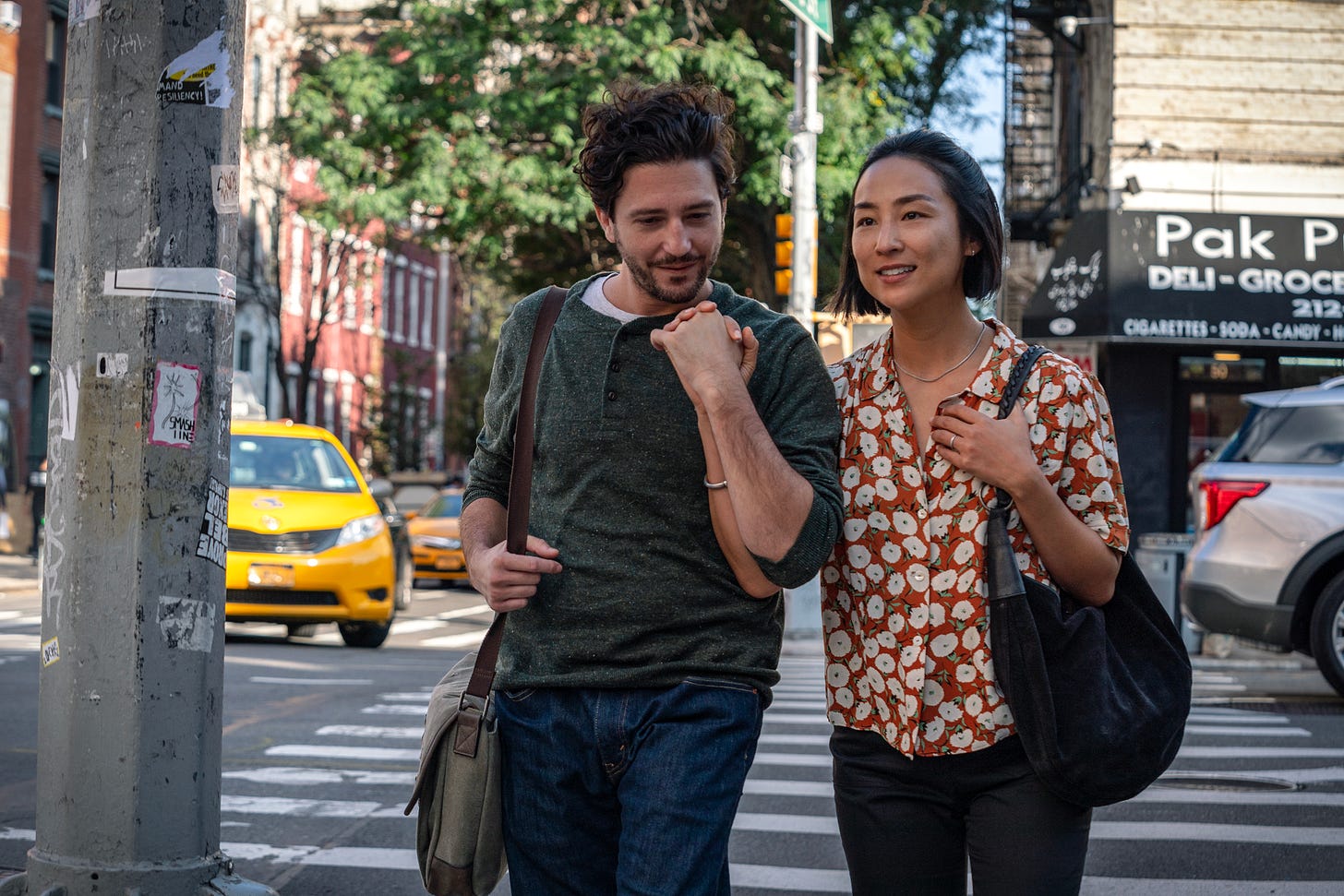
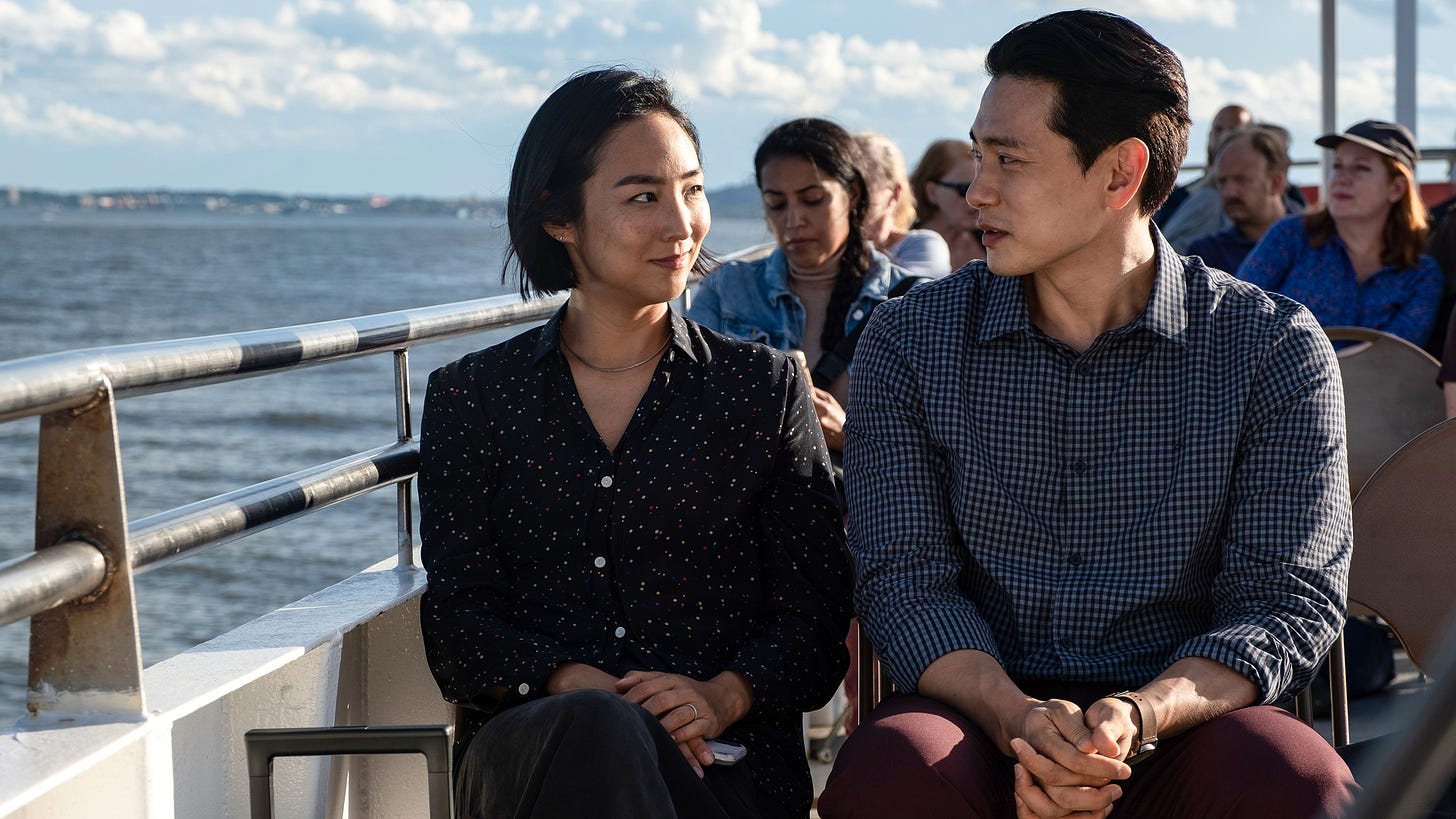
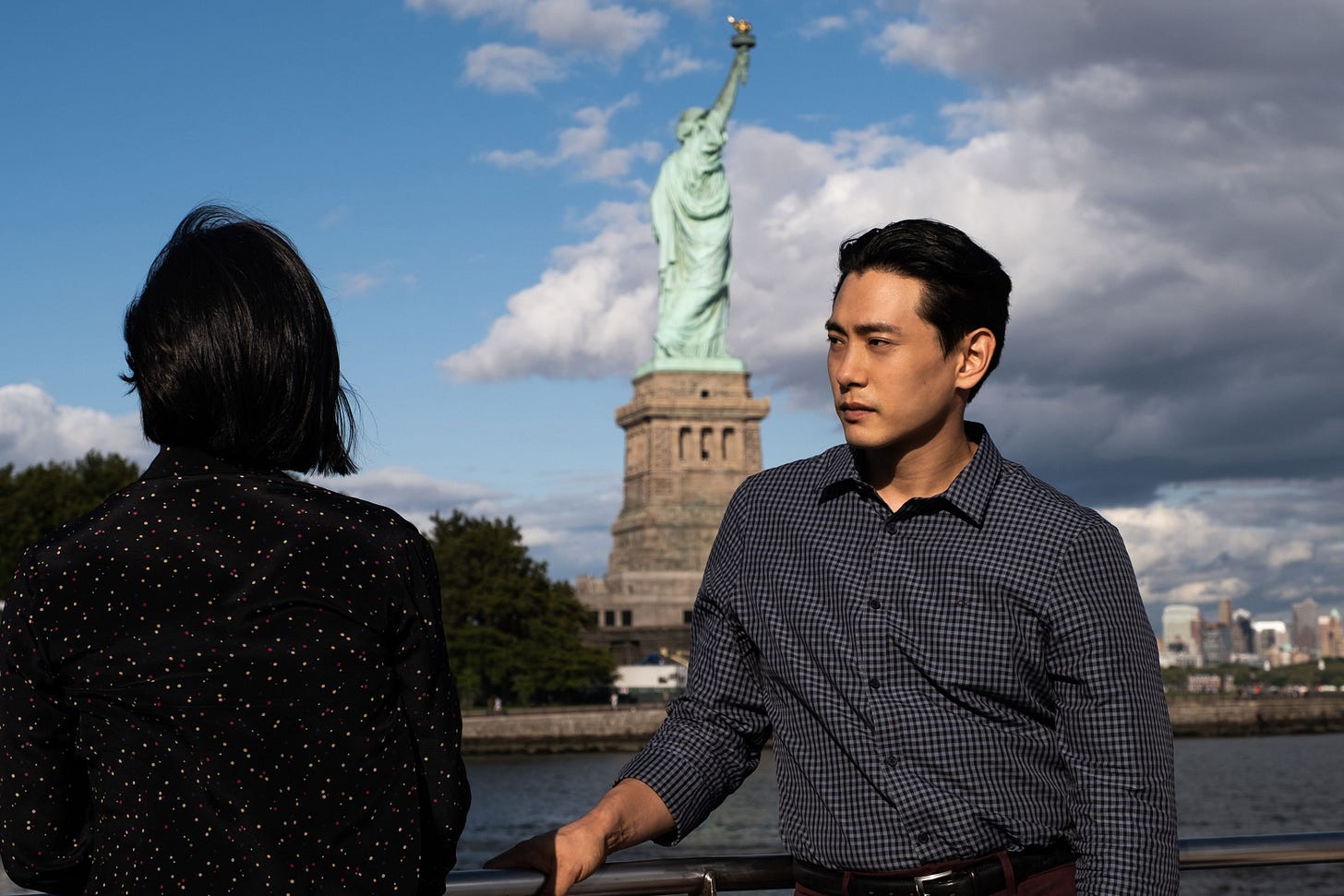
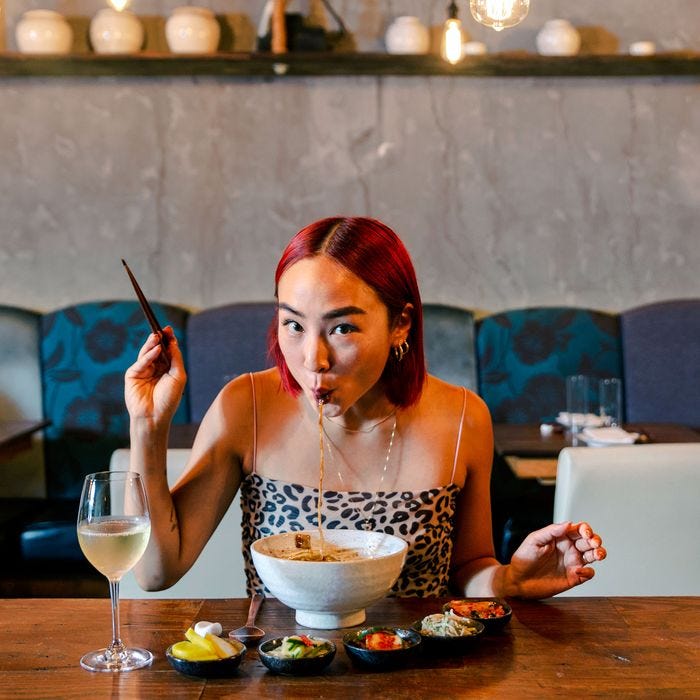

![Past Lives' Director Celine Song Is Already Excited About Her Next A24 Film [Interview] Past Lives' Director Celine Song Is Already Excited About Her Next A24 Film [Interview]](https://substackcdn.com/image/fetch/$s_!OyDL!,w_1456,c_limit,f_auto,q_auto:good,fl_progressive:steep/https%3A%2F%2Fsubstack-post-media.s3.amazonaws.com%2Fpublic%2Fimages%2F030e36a1-7487-480b-ad4e-03b942930521_750x400.jpeg)

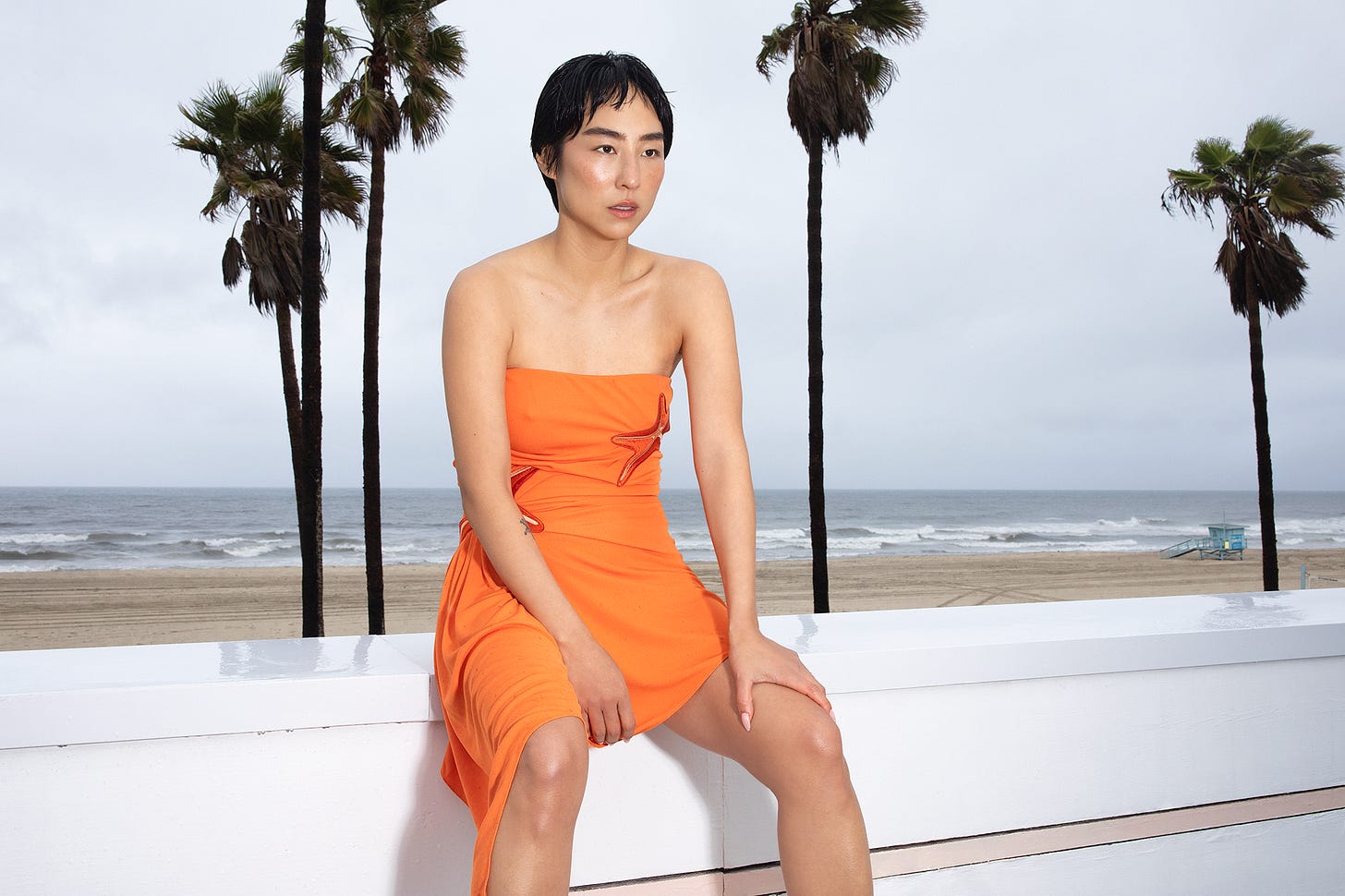
I am so happy about this interview. I’m a performer and was based in NYC for over a decade; I moved back to the Baltimore area March 1 this year after losing my dad to cancer. Seemed like the right move. I was in the city earlier this month for a gig and all I wanted to do was walk the city. I’m still broke, so protein bars and long walks were my diet for two days. 12 days Sunday, 9 miles Monday, including a ramble from the West Village down 6th Ave to Canal, across the Manhattan Bridge to Roulette to see a friend play. Tuesday morning, Chelsea for the galleries. Took myself for a fine Italian lunch, and walked to Penn to catch Amtrak. So civilized, so lovely, so NYC. I’m headed back at the end of July for rehearsals in Astoria - I love Queens! My hit list includes M Wells, Long Island City, and the Queens Museum, across that magical park with the giant metal globe surrounded by a fountain, a relic of the Worlds Fair. Exquisite place to visit during the pandemic, when there were no live sports events at the stadiums nearby.